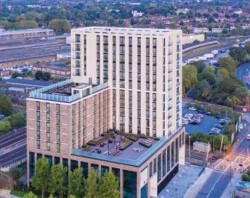Tide Construction and Vision Modular Systems, take a look back on 2019 and show how modular construction is reaching new heights.
2019 was a monumental year for our industry, seeing several decisive steps taken by government, industry and finance to get British modular construction to reach new heights. As the year drew to a close, we saw the Housing Minister Esther McVey announce Mark Farmer as their MMC housebuilding champion, to help guide the development and direction of this growing sector.
At Tide Construction and Vision Modular Systems, 2019 was yet another busy year for our teams which saw us deliver 1,500 new homes, reach in excess of 6,000 student beds, complete the installation of modules for a new Premier Inn hotel, and move residents into one of the UK's biggest Build-to-Rent schemes – Greenford Quay in Ealing.
The crowning moment for our business, and perhaps the wider modular industry, was installing the final module at 101 George Street in Croydon, making the 44-storey and 38-storey development the world's tallest modular building. This project is testimony to what modular construction can achieve within the UK, showcasing the very best of our engineering, manufacturing and design, and proudly stating to the rest of the world that the UK is a global leader in modular construction.
Having delivered three of the world's tallest modular developments, which alongside 101 George Street includes our 90m high Apex House development in Wembley and our 89m high Mapleton Crescent project in Wandsworth, we've been championing this view at Tide Construction and Vision Modular Systems for some time.
The benefits of manufacturing offsite are now widely recognised. The majority of the build stage of Tide Construction and Vision Modular System's projects are completed in a factory environment ensuring a much higher standard of quality, a much faster pace of delivery and certainty of programme. We ensure that all schemes that run off our production lines are fundable, mortgageable and insurable by securing accreditation from the leading certification bodies. And our efficient construction logistics ensure significantly less disruption to the local communities and environments we operate in, which has been welcomed by our partners and local authorities.
Furthermore, the benefits of modular construction and indeed our own system does not stop there. As the re-elected Conservative government gears up to tackle the UK's housing crisis, pledging to deliver one million new homes within the next five years, ensuring newly-built homes are both energy efficient and sustainable will be crucial in reducing the built environment's carbon footprint.
Our modular system enables us to cut waste by 80% and recycle 97% of the waste produced. The fittedout finish of the modules results in 80% less traffic movements to site, and latest research shows a carbon emissions savings in our buildings of approximately 50% when compared to traditional construction.
However, whilst offsite manufacturing has taken off in recent years, the success and energy of this welcomed momentum will rely on two things: planning reform and attracting a new pool of talent into the construction industry. What we need is more certainty from the planning system itself. 101 George Street and our close collaboration with the London Borough of Croydon demonstrates the huge efficiencies that can be derived from a forward-thinking local authority. Thanks to this dynamic we can deliver the world's tallest modular building in record time; both from a planning and construction point of view.
Secondly, but equally as important for the success of modular, is a joint effort from the government and industry to attract a new pool talent to the construction industry. More must be done to promote and emphasise the fact that offsite manufacturing offers workers a far more settled work life. In our factories our Vision Modular teams go to work at the same place each day in a much cleaner, safer, temperature controlled environment.The time for modular construction is now and offsite manufacturing has become mainstream in our view. Although 2019 was a milestone year for the industry, we must not rest on our laurels. We must continue to advance and innovate to ensure that the new decade is one in which our entire industry can continue to be proud of.









